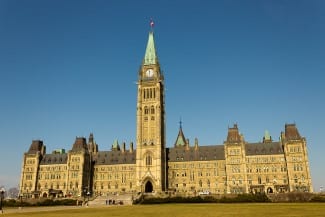Canada’s Foreign Policy: What Does it Mean for Your Business?

A recent report from the Canadian Global Affairs Institute, Prime Minister Justin Trudeau: A Foreign Policy, by Colin Robertson, examines the Prime Minister’s handling of international relations during his time in office so far. The report breaks down Trudeau’s policies in relation to climate, gender, reconciliation, security, unity, and relations with the US.
For Canadian businesses, understanding Trudeau’s foreign policy is important, as such policy influences the government funding available to support exporting and other international activities.
The key points of Robertson’s report on Trudeau’s policies are outlined below, in relation to what Canadians have seen and may see in the government funding landscape.
Foreign Policy and Canadian Government Funding
Helping Businesses Respond to Climate Change
Trudeau endorsed and signed the Paris Climate Accord, which unites countries around the world in battling climate change. While such commitments might be complicated for Canada, given its reliance on energy sources (coal, oil, natural gas, uranium) as exports, climate change has been one of Trudeau’s personal priorities. Federal Budget 2017 allocated over $2.3B to support the growth of Canadian clean tech firms and exports. Since then, numerous cleantech projects have been awarded millions in government funding.
The Climate Action Incentive Fund, for example, aimed to distribute up to $218M in its first year (2019-2020). The stream for small and medium-sized enterprises (SMEs) helped businesses undertake retrofit projects to improve energy efficiency, reduce emissions, or complete other projects with environmental benefits.
Gender, Diversity & the Economy
According to a report by the McKinsey Global Institute, advancing women’s equality in Canada has the potential to add $150B billion in incremental GDP in 2026. Trudeau’s policies and actions on this front included the formation of a cabinet with an equal number of men and women, the passing of pay equity legislation, and the creation of a feminist international assistance policy.
The federal government also invested $2B in the Women Entrepreneurship Strategy (WES), a suite of programs to help women grow their businesses and position themselves for new or increased exports. For example, under WES, the Business Development Bank of Canada now offers the BDC Capital Women in Technology Venture Fund to support and invest in women-led tech companies.
Indigenous Entrepreneurship
In 2016, Trudeau’s government signed the UN Declaration on the Rights of Indigenous Peoples (almost a decade after it was first passed by the UN), acknowledging the rights of Indigenous individuals in relation to culture, language, religion, and other issues.
Economic policy has reflected this acknowledgement and support for Indigenous autonomy. The government’s report Canada’s State of Trade 2019 points to the significant growth in the number of Indigenous-led businesses—at a rate much faster than those of non-Indigenous led businesses—and their contributions to the Canadian economy. To support this growth, the federal government has invested in programs such as the National Aboriginal Capital Corporations Association’s (NACCA) Indigenous Growth Fund to support First Nations, Inuit, and Métis entrepreneurs across Canada.
International Trade Relationships
The Trudeau government has recognized Canada’s reliance on the US as a major trading partner, and Trudeau has worked to preserve good Canada-US relations and negotiate the new North American Free Trade Agreement (NAFTA).
At the same time, the Canadian foreign affairs policy has also implemented strategies to help diversify exports. According to Robertson’s report, “Trudeau understood that our nation’s trading interest is best served by opening new markets and diversifying Canada’s trade dependence – 75 per cent of our exports – on the US.”
The recently re-vamped CanExport program provides funding to SMEs and other organizations to support increased exporting of Canadian goods and services. As well, Export Development Canada continues to provide insurance and financial services to Canadian exporters, and helps connect SMEs with foreign buyers.
Provincial Priorities & Small Business Funding
The Institute’s report points out that two of the main areas of focus for Canadian Prime Ministers are to keep the economy prosperous and sustain national unity. This emphasis on economic health and keeping all of Canada’s regions thriving may be reflected in the federal government’s injection of funding into the Regional Development Agencies (RDAs). These federal agencies are locally governed across Canada—in the Western provinces, Southern Ontario, Northern Ontario, the Atlantic provinces, and Canada’s North; they focus on helping companies scale up and develop new markets.
In Budget 2018, the federal government announced an annual $20M in support for the Canadian Northern Economic Development Agency (CanNor) and $920M, over six years, for the Federal Economic Development Agency for Southern Ontario (FedDev Ontario).
Federal funding for the RDAs supports programs such as the FedDev Ontario Training Program, which provides support for SME manufacturers to undertake training or skills development activities so they can scale up and become more globally competitive. RDA funding also supports the Business Scale-Up & Productivity (BSP) program across all the country’s regions. BSP helps companies adopt new technologies and enter new global markets.
What Might Be Ahead in Canadian Foreign Affairs & Canadian Government Funding
Businesses can watch for Trudeau’s next moves in relation to Canadian foreign policy and other priorities, and the impacts that these moves are likely to have on the economy and Canadian government funding.
Funding for Clean Technology
Climate change will likely continue to be a priority for Trudeau’s government, especially as it is a major component of Canada’s campaign for a seat on the UN Security Council. On the funding front, the government is already advertising an upcoming Rebate Stream for the Climate Action Incentive Fund, which would support SMEs and not-for-profit organizations in the purchase of ENERGY STAR certified equipment. There will also likely be another intake of the Climate Action Fund, for projects that raise awareness of climate change and build capacity for action to address climate change.
Small Business Funding
Given Trudeau’s goal of diversifying exports, Canadians are likely to see continued or new supports to help small businesses grow, especially as NAFTA and the Canada-European Union Comprehensive Economic & Trade Agreement (CETA) lower trade barriers for companies. According to Canada’s State of Trade 2019, government programs can be essential in diversifying Canadian exports:
“Supporting small businesses could help Canada to reach its goal of increasing overseas exports by 50% by 2025.”
Additionally, Budget 2019 committed to spending millions on the Industrial Research Assistance Program, which funds business R&D projects. The Budget also promised continued spending on the Regional Development Agencies, including giving $100M over three years to Western Economic Diversification Canada, to assist the economy in Canada’s western regions. The same budget also committed to providing $100M over four years to the Strategic Innovation Fund, especially for clean tech projects and the agri-food industry.
Funding for International Trade & Collaborations
Overall, Trudeau has managed to maintain a good relationship with the US, give a lift to Canada’s relationship with Mexico, and develop close relationships with Ireland, New Zealand, and France. However, relations with China, Russia, and Saudi Arabia are strained.
According to Robertson, one way for Canada to improve international relations is to invest in foreign affairs and open new embassies: “Diplomatic relations are not a seal of approval but rather the means by which we conduct business, most of it having to do with people-to-people transactions.”
Currently, Canadian businesses have access to funding programs for international business activities through the federal government, foreign governments, or multilateral agencies. For example, the Canadian International Innovation Program currently provides funding for collaborative international research projects. As Canada’s relationships with other countries continue to evolve, it is possible that we’ll see such programs expand, or new programs open.
For more Canadian business and government-related news, Mentor Works sends out an E-Newsletter every Monday afternoon. We encourage you to subscribe to never miss a beat in the world of Canadian government funding!

